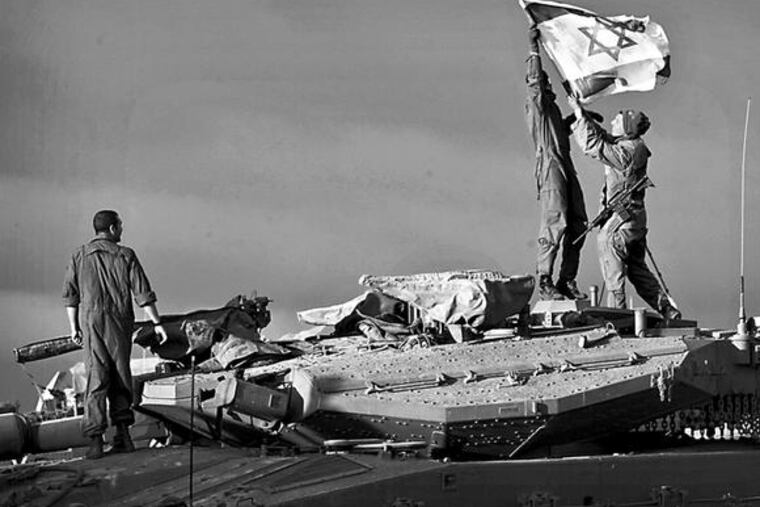Israeli assault could backfire
BEIRUT - Israel's assault on Gaza is a gamble that may succeed in irrevocably weakening the Palestinian Hamas movement - but it also could backfire by strengthening Hamas and other radicals in the way that the 2006 Israel-Hezbollah war ended up emboldening Lebanon's extremist Shiite movement.

BEIRUT - Israel's assault on Gaza is a gamble that may succeed in irrevocably weakening the Palestinian Hamas movement - but it also could backfire by strengthening Hamas and other radicals in the way that the 2006 Israel-Hezbollah war ended up emboldening Lebanon's extremist Shiite movement.
The longer Hamas holds out against the Israeli offensive, the greater the likelihood of comparisons to the Lebanon war, in which Hezbollah stood firm against massive Israeli air strikes and earned the widespread adulation of the Arab world, according to experts in the Middle East.
Hezbollah later leveraged its enhanced prestige to push for greater political power within the Lebanese government - thereby increasing the influence of its patrons, Iran and Syria, in the region.
A similar scenario could unfold in Gaza, where Hamas, also backed by Iran and Syria, will need only to survive to claim a victory of sorts, said Hilal Khashan, a political scientist at the American University of Beirut.
"As long as Hamas holds on, Hamas can always say it held its ground," he said. "No matter how this ends, the position of the so-called Arab moderates will deteriorate and Iran will get stronger."
Already, regional peace efforts have been hurt by the halting of indirect talks between Israel and Syria: Turkey, a majority Muslim nation that has relations with Israel, said yesterday that it could no longer be a broker in the talks given the ferocity of Israel's onslaught. Syria suspended its participation Sunday.
In Tehran, more than 3,500 people signed up to a Web site launched by a group of conservative clerics soliciting volunteers to fight Israel.
And in the southern suburbs of Beirut, tens of thousands of supporters of Hezbollah staged the biggest Arab rally yet against Israel's attacks on Gaza.
Addressing the crowd via a video link, Hezbollah leader Hassan Nasrallah refrained from threatening direct intervention on behalf of the Palestinians. And with the region's authoritarian regimes firmly in control of their police states, a spillover of the violence seems unlikely.
But the fact that Hamas is Sunni, and ideologically affiliated with the Muslim Brotherhood, the region's most influential Islamist movement, enhances the appeal of the movement's plight to ordinary Arabs, said Diaa Rashwan of the Cairo-based Al Ahram Center for Political and Strategic Studies.
Much of the wrath in the Arab world has been directed toward Egypt, which has refused to open its borders with Gaza to refugees and to let supplies reach stricken Palestinians. Nasrallah accused Egypt of "complicity" in the attacks on Gaza.
The Brotherhood is also Egypt's biggest opposition movement, and about 3,000 of its supporters demonstrated in Cairo yesterday. Egyptian police are out in force on the streets of the capital, underlining the regime's nervousness, Rashwan said.
"The Israelis are making the same mistake the Americans made in Iraq and the Israelis themselves made in Lebanon in 2006," he said. "Aggressive actions such as these only increase the popularity of Islamists in the Arab world and widen the gap between many Arab regimes and the people, with the result of a further destabilization of the region."
Hamas' association with Iran is viewed with suspicion by many Arabs, and a successful Israeli offensive could significantly reduce Iran's influence in the region, said Riad Kahwaji of the Dubai-based Institute for Near East and Gulf Military Analysis.
"If Hamas was out of the equation, then Iran will have lost one of its bargaining cards with the West," he said.
Analysts said Israel already appears to have made greater inroads against Hamas in the first days of its offensive than it did against Hezbollah, which triggered the 2006 war by kidnapping two Israeli soldiers and was well-prepared for retaliation. But Hamas showed defiance yesterday, firing off rockets and mortars that killed three Israelis. Reportedly, its senior leaders have gone into hiding.
With footage of the bloodied child victims of the Gaza air strikes swamping Arab TV screens round the clock, Israel can't afford a long campaign, Kahwaji said.
"This is going to radicalize a lot of elements in the region," he said. "The longer it lasts, the smaller the political gains Israel will make and the more the radicals will gain."